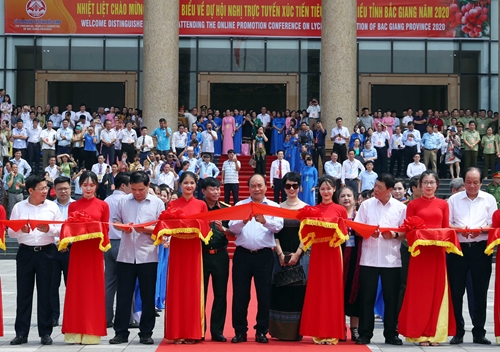The conference linked Bac Giang with 61 sites in cities and provinces across the country, and four sites in China, with more than 2,300 participants.
During his visit to Bac Giang, Prime Minister Nguyen Xuan Phuc cut the ribbon for the first trucks of lychee to be delivered to the domestic and foreign markets.
    |
 |
|
Prime Minister Nguyen Xuan Phuc cuts the ribbon for the first trucks of lychee to be delivered to the domestic and foreign markets. Photo: VGP |
Speaking at the online meeting, Vice Chairman of the provincial People’s Committee Lai Thanh Son said with a total area of 28,000 ha, Bac Giang harvests 150,000-200,000 tonnes of the fruit each year. This year’s output is estimated at 160,000 tonnes.
Up to 15,000 ha of lychee have met VietGAP standards while 218 ha satisfy GlobalGAP standards, he said, stressing that Japan has issued 19 lychee growing area codes and China granted 149 lychee growing area codes and certified 288 packaging facilities in Bac Giang.
Bac Giang plans to sell half of the lychee in the domestic market and the rest for export, according to the official.
Son expressed his hope to welcome more domestic and foreign businesses and traders, pledging that Bac Giang will facilitate lychee growing, harvest and consumption.
Deputy Minister of Agriculture and Rural Development Le Quoc Doanh said Bac Giang has paid more attention to good agricultural practice and food safety. Therefore, its lychee has conquered picky markets and Bac Giang lychee brand name has been protected in eight countries.
A Chinese businessman told the conference that Bac Giang lychee is now famous in China and favoured by consumers in that country thanks to its good quality.
Other delegates at the meeting suggested the border provinces of Lao Cai and Lang Son coordinate with Chinese authorities to facilitate lychee export, especially in terms of administrative, quarantine and customs procedures.
Deputy Minister of Industry and Trade Do Thang Hai said his ministry will join hands with overseas Vietnamese agencies and instruct commercial affairs offices abroad, particularly those in China, Singapore, Australia and Japan, to promote lychee and boost connectivity in lychee export.
Source: VNA